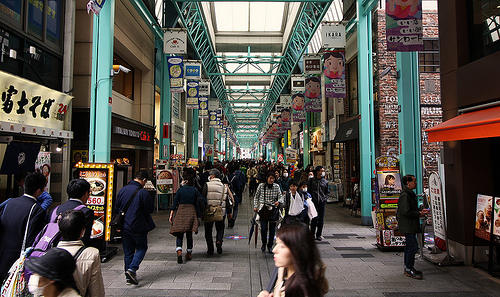Lesson 4 - Vocabulary:
Shopping and repairs
(photo
by Blondinrikard Fröberg used
under terms of Creative Commons license.)

The system
of writing Japanese
used in this
course is
called the
Hepburn system. Pronunciation
of most of
the
letters presents no
difficulty to an
American. Those letters or
combinations of letters
considered difficult to
pronounce will be explained in
this section of
the lessons.
In lesson
4 you may
have difficulty with
the following:
1. When
double letters appear
in a Japanese
word, as
in kasetto, ikkai,
and irasshaimase, the
sound is repeated. Think of
double letters as
having a hyphen
between them and pronounce
both letters distinctly.
Listen:
|
kaset-to
|
mot-to
|
i k- ka i
|
rok-kai
|
irash-shaimase (irasshaimase) |
2. When
i and u
are written with
a slash mark
through them, they are
slurred, or barely
pronounced. Listen to the
difference in pronunciation
of the i
and the
i in kirashite:
kirashite
Now
listen
to the difference
between the u
and the u in
the words
sumimasen and sutereo.
|
sumimasen |
s |
3.
The
letters marked with
a bar, ā,
ī,
ō,
are pronounced longer
than those without
a bar.
Listen:
|
ash |
rekōdā |
iro |
īno
|
go-kai |
ōkī |
4. The
letter g in
the middle of
a word is
pronounced like the ng
in "sing" by
natives of
|
arigatō
|
o-negai shimas |
sangai |
|
sumimasen |
excuse me; I'm sorry |
|
irasshaimase |
nice to have you |
|
setomono |
chinaware |
|
kakemono |
scrolls |
|
kamera |
cameras |
|
fuirumu |
film |
|
rajio |
radios |
|
s |
stereos |
|
kasetto rekōdā |
cassette recorders |
|
arimas |
we have |
|
arimasen |
we don't have |
|
arimas |
do you have? |
|
setomono arimas |
do you have chinaware? |
|
kore |
this (one); these |
|
kore arimas |
do you have this? |
|
hai |
yes; yes, sir; yes, ma'am |
|
hai, arimas |
yes, we do (have them) |
|
īe |
no |
|
īya |
no |
|
īe, arimasen
|
no, we don't (have them) |
|
ima kirash |
we're out of stock now |
|
sumimasen, ima
kirash |
I'm
sorry; we're out
of stock
now |
|
ik- kai |
first floor |
|
ni-kai |
second floor |
|
san-gai |
third floor |
|
yon-kai |
fourth floor |
|
go-kai |
fifth floor |
|
rok-kai |
sixth floor |
|
san-gai des |
on the third floor |
|
rok-kai ni
arimas |
on the sixth floor |
|
motto ōkī
no |
a larger one |
|
motto chīsai no |
a smaller one |
|
motto yasui
no |
a cheaper one |
|
motto ī no
|
a better (quality) one |
|
hoka no |
another one; a different kind |
|
hoka no
iro |
a different color |
|
motto chīsai no arimas |
do you have a smaller one? |
|
hoka no
iro arimas |
do you have a different color? |
|
kudasai |
please |
|
kore kudasai |
(I’ll take) this one, please |
|
h |
one |
|
f |
two |
|
mitts |
three |
|
kore f |
I’ll have two of these, please |
|
shōshō
o-machi kudasai
|
just a minute, please |
|
dekimas |
we can do it |
|
dekimasen |
we can't do it |
|
dekimas |
can you do it? |
|
kore dekimas |
can
you do this?/can
you fix
(develop, take care
of) this? |
|
kyō |
today |
|
ash |
tomorrow |
|
kyō dekimas |
can you do it today? |
|
iya, ash |
no,
(but) we can
do it (by) tomorrow |
|
jā
o-negai shimas |
okay, fine then |
|
dekimash |
is it done?/is it ready? |
|
kore dekimash |
is this ready? |
|
dōmo |
thank you |
|
dōmo arigatō
gozaimash |
thank you |
|
mata dōzo |
please come again |
|
jā mata |
see you later |